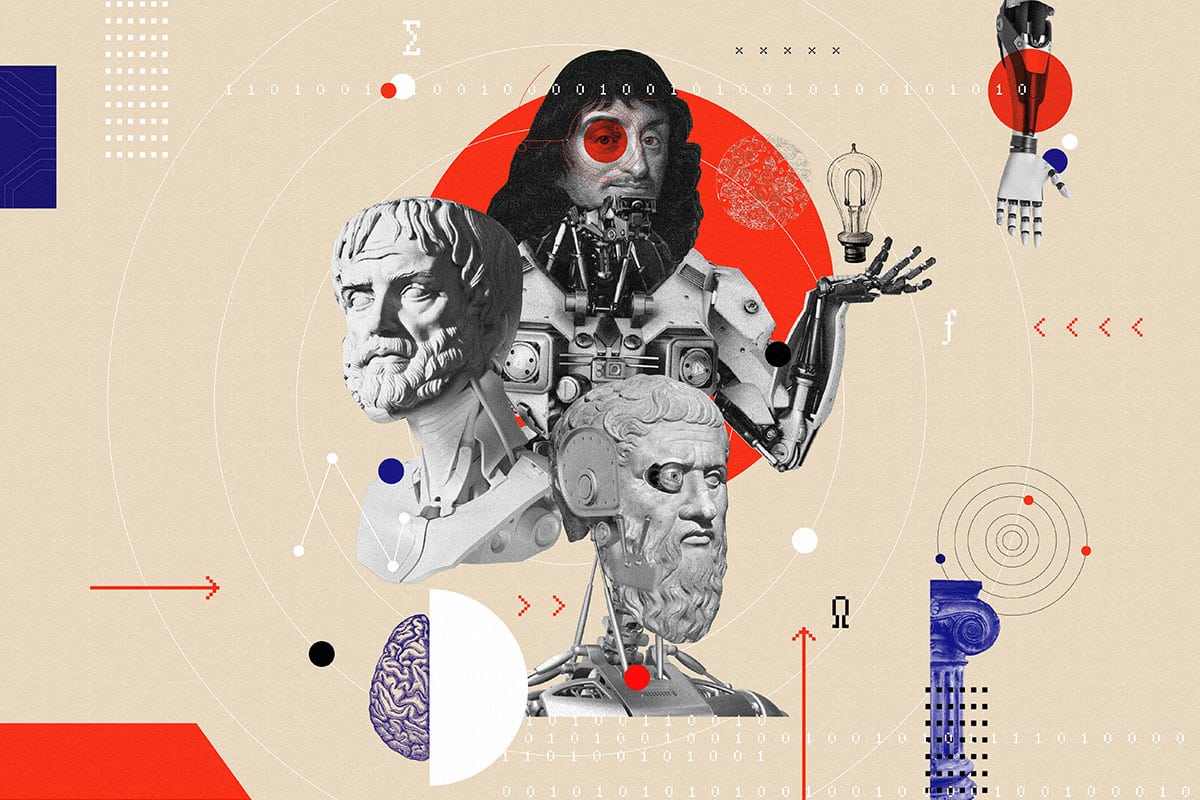Could AI outthink the greatest (human) philosophers?
Tuesday, November 30, 2021

Originally published by Wired Middle East on November 3, 2021
There is a debate under way as to whether machines will ever be able to answer life’s biggest questions—or even just grasp the significance of a stubbed toe.
Dreams still live on the wings of happiness.
Ding-a-dong, sweet song.
Lu-lu-la.
The above lines may not sound like the basis for a revolution in philosophical thought. Certainly, they don’t carry the intellectual weight of, say, “the unexamined life is not worth living” (Socrates) or “existence precedes essence” (Jean-Paul Sartre). For a more direct parallel, you’d have to go back to the first time a caveman asked why rocks hurt when they hit you on the head—an early and very basic stab at ontology, which aims to understand the nature of being.
Alongside phrases like “ding-a-dong, sweet song,” even the old rock-on-the-head conundrum seems fraught with philosophical complexity. Yet the song that spawned these lines—the 2020 synth-pop number Beautiful the World—may represent something much larger than a jumble of syrupy, slightly garbled sentiments. This is due to the fact that its music and lyrics came, in large part, from the mind of a machine.
The work of data scientists doesn’t often make for thrilling headlines. In the spring of last year, however, the team behind Beautiful the World—which included researchers from the University of New South Wales (UNSW) in Australia—became an exception to that rule. It wasn’t so much that the song’s lyrics were seen as a breakthrough in computer language models; the real hook was that it picked up top prize at the inaugural AI Eurovision Song Contest.
As impressive as that may be, it doesn’t explain how we get from ding-a-dong to Descartes. That leap came shortly after the Eurovision win, when another headline-friendly UNSW project posed some of life’s most pressing questions to an AI language model (including “what is the meaning of life?”). In a subsequent poll, respondents claimed to prefer several of the machine-generated responses over those from the likes of the Dalai Lama, Isaac Newton, and (ahem) Elon Musk. In technological terms, the experiment wasn’t far removed from the university’s foray into pop music—what made this one exciting was the notion that a computer might be able to outthink human philosophers.
The university’s researchers are by no means the first to try to crack this nut. In the late 1980s, the American philosopher John L. Pollock devoted himself to developing an artificial intellect—or “artilect”—called Oscar. At around the same time, IBM began using the ad slogan “I think, therefore IBM.” More recently, massive artificial neural networks have been used to emulate the functions of the human brain. Then there are projects like Philosopher AI, which uses the GPT-3 language model to answer (or evade) users’ questions. Even Siri and Alexa can be coaxed into rudimentary intellectual discussion.
Toby Walsh, a professor of artificial intelligence at UNSW, admits that such systems are largely a matter of smoke and mirrors, in that they mimic philosophical inquiry rather than perform it. The question now is, will researchers be able to go from this point to something more meaningful? As for the answer—well, as Alexa might put it: I’m sorry, I don’t know that.
“Our study took a small step forward,” says Walsh. “Rather than the kinds of witticisms you get when you ask Siri a question, or AI Philosopher—which is hand-coded, canned responses—we showed what you can do when you take all the text you can find on the internet and pour it into a large neural network that has billions of parameters. We were able to do more than generate plausible sentences, but it’s still very limited.” He is hopeful, however, that this approach will help advance the field of AI philosophy, given that “language is the basis of thought.”
Eric Xing, president of Mohamed bin Zayed University of Artificial Intelligence in Abu Dhabi, takes a more skeptical view. He compares the work being done with current language models to “sending a duck with ink on its feet to walk around on a piece of paper and calling it abstract art.” He adds: “You can combine fragments from all these famous people and make something that sounds profound, but as far as that machine knowing what it is talking about, or whether its philosophy is meaningful or not, I don’t see that.”
Language is just one of the threads running through an ongoing debate about when—and if—artificial intelligence will be able to say anything meaningful about subjects like mortality, the existence of the universe, and what it means to be human. Believers include heavyweights like the philosopher John Searle, who argued that the right computer with the right inputs would “have a mind in exactly the same sense human beings have minds.”
Iranian data scientist and writer Hadi Aghazadeh takes a similarly optimistic view. “I think AI can potentially solve philosophical issues,” he says. “It’s an intrinsic desire in humans to build things that are superior in some way—things that are faster or stronger or smarter than we are. Maybe technology will help us overcome the limitations of our minds and answer these questions. It is something we can and should do.”
But then, as Xing reminds us, AI has a long way to go before it can help us overcome much more than the limitations of our data processing abilities. Right now, he says, “being genuinely profound is a human ability.”
There’s a tendency among non-experts to overstate the abilities of artificial intelligence. This is partly due to a slew of brainier-than-thou machines in science fiction—the ethical bots in Isaac Asimov’s I, Robot, say, or the vampish virtual assistant in the film Her. The media, which loves a good rise-of-the-robots story, must also shoulder some of the blame. The reality is that machines are fantastic at performing specific tasks—recognizing faces, or crunching numbers, or playing chess, or writing sonnets in the style of William Shakespeare. What AI cannot do is think—at least not in the way that we understand the word.
So it is, in labs around the world, scientists are grappling with cognitive architecture systems, neural networks, and neurosynaptic chips, all with the grand ambition of making the leap from the artificial narrow intelligence we have now to a more humanlike state of general intelligence. At this point, in theory, AI will have access to the same bag of cognitive tricks that we do—stuff like common sense, imagination, abstraction, free association, and a grasp of cause and effect. Right now, says Walsh, in terms of general intelligence, “machines are easily eclipsed by a 3-year-old.”
The title of Walsh’s book 2062: The World that AI Made refers to a survey he conducted in which hundreds of AI experts were asked when they think machines might equal or surpass human intelligence (with 2062 being the average answer). “We shouldn’t be surprised if it does take that long,” Walsh says. “The human brain is the most complex thing in the known universe, and it took millions of years for that to evolve, but we should have it within the century.”
Xing, while discussing the limitations of current AI, recalls a 2002 speech delivered by former US defense secretary Donald Rumsfeld, in which he divided knowledge into three categories: known knowns, known unknowns, and unknown unknowns (the latter of which he said represented the greatest threat to US security). “In that statement, Rumsfeld pointed to the genius of human intelligence,” says Xing. “It would be very hard for a machine to identify what it doesn’t know, to ask that question of itself and so increase its knowledge.”
Another significant shortfall in current AI, Xing continues, is its inability to engage in counterfactual thinking. “We might ask ourselves, for example, what the world would be like if John F. Kennedy hadn’t been shot,” he says. “Humans can handle that comfortably, but in AI it is non-existent right now.” It seems patently clear that without this ability—the capacity to make the imaginative leap from “what is” to “what if”—machines will never achieve genuine philosophical thought.
[wps_pull-out-quote-right content=”I don’t believe a machine that exceeds human intelligence, or equals it, has to mean it behaves in a human way.” surename=”Professor Eric Xing” source=”MBZUAI President”]Which isn’t to say that Xing has lost hope. “It’s not too far-fetched to suppose AI can go from factual reasoning to something more complicated,” he says. “If the vast amount of data collected by machines becomes assimilated into their internal representations, something interesting might happen. I imagine certain insights could be extracted by training AI to build some kind of predictive or pattern discovery framework. We are gradually working toward slightly fancier reasoning.”
Even if this fancier reasoning doesn’t pan out, there is a plan B. In 1950, the English computer scientist Alan Turing devised his famous Turing test (or “imitation game”), whose aim was to fool people into thinking a machine had humanlike intelligence—which, Turing proposed, would suffice, even in the absence of the real thing. “From the engineering perspective, I’d have to agree,” says Walsh. “If it walks like a duck and quacks like a duck, we may as well call it a duck.”
Aghazadeh isn’t so sure. “It’s not enough to have a machine pretend to be human,” he says. “We have to find ways to build new kinds of minds, new ways at looking at things. If we can do this, our definition of humanity will change.”
So we’re agreed, then, that by expanding AI’s horizons—using a combination of deep learning technology, complex neural networks, carefully curated input, and sophisticated language models—we will finally be able to seek its help in our never-ending question for meaning. Thanks for reading.
Except…
There is actually another piece to the puzzle—a shapeshifting, unseeable glob of conceptual matter we call consciousness. This is the bit that keeps AI researchers awake at night. “It’s remarkable: you open your eyes in the morning and suddenly you’re conscious,” says Walsh. “That’s the experience of being alive, the profound meaning of being alive, yet we have no idea what it is. We know it resides somewhere in the brain, but ask a neuroscientist which part and they will have no idea.”
The very notion of consciousness, Walsh continues, introduces a snarl of questions that are, right now at least, impossible to pick apart. “Can you have intelligence without consciousness, or consciousness without intelligence? The fact is, we have no idea,” he says. “We could end up with intelligent machines that have no consciousness—a kind of zombie intelligence. But there is also an argument that you can never have true intelligence without some form of introspection.”
Here’s what we think we know about consciousness: it involves self-awareness, sensory perception, and some kind of correspondence between memory and emotion. It is also associated with a multitude of abstract nouns—devotion, contempt, pity, pride, gratitude, shame. A hankering for a chicken shawarma is an expression of consciousness, as is an aversion to the music of Katy Perry. The question is: how do you cram all that into a machine? Harder still: how do you explain the significance of a stubbed toe?
Pain, that great motivator, is a matter of particular interest to people like Walsh. “A lot of philosophy is about trying to explore existence, and a part of that is suffering,” he says. “Machines may never be alive in the way we understand the word—they certainly aren’t today—so whether they’ll be able to understand questions of morality, for instance, is unclear. Maybe we will have to give our robots the ability to suffer, which leads to serious moral problems of its own.”
Xing, too, is quick to warm to the subject. “How to make AI suffer is an interesting question,” he says. “A machine does not have a biological structure, so people wonder whether it might ever feel emotion.”
Then again, there are those who would say that humans are nothing more than machines themselves, albeit made of gloopier materials. Xing takes this thought and runs with it. “When a nuclear power plant has a malfunction, we don’t call it an emotion, we call it mechanical failure,” he says. “But you could also argue that emotional trauma is a kind of breakdown. It happens when a part of the brain goes wrong.”
Speaking of things going wrong: in 2016, the internet was awash with gleeful tales of renegade chatbots resorting to obscene language and racist comments in their human interactions—which, according to Xing, could be seen as a kind of artificial emotional meltdown. “Was that because of a programming failure or because the machine was having a difficult time?” he says. “I would caution against treating AI as a person, or describing its behavior using human standards, but these are interesting questions.”
Another interesting question is how these chatbots picked up such terrible habits—the answer being, of course: they learned them from the internet. And this point may actually suggest a solution to AI’s existential crisis—its failure to achieve being-in-the-world. It’s not too much of a stretch to imagine an artificial intelligence roaming a virtual world, some obscure part of its neural network fizzing when it encounters Pride and Prejudice or stubs a digital toe. It’s not what we humans would classify as experience, but who said intelligent machines have to be just like us?
Both Xing and Walsh, it turns out, would argue that the chances of a machine’s mind working exactly like our own are slim. “I don’t believe a machine that exceeds human intelligence, or equals it, has to mean it behaves in a human way,” says Xing. “We built aircraft from looking at birds, but planes don’t behave in the same way, they don’t flap their wings. AI will achieve its goals, but probably in very different ways.”
This line of thinking worries Aghazadeh. “If we don’t put human feelings into machines, if they are just thinking logically, they will lack morals, they will lack kindness,” he says. “So maybe the answer to overpopulation, for a machine, is to kill half the people on Earth. That may seem logical, but we as humans cannot have that. This is a real danger, so we need to give AI the feelings and values we care about.”
Walsh has less drastic concerns. “Right now, machines are used for the four Ds—tasks that are dirty, dull, difficult, and dangerous,” he says. “It may be a lucky break for us if they don’t achieve consciousness, so we won’t have to worry about asking them to do mundane things.” He goes on to recall the endless grumbling of Marvin the Paranoid Android, the dour robot in Douglas Adams’ spoofy sci-fi series Hitchhiker’s Guide to the Galaxy. “What we don’t want is a machine saying things like, ‘here I am, brain the size of a planet, and all you want me to do is open the door.’”
Related
UAE to deploy 8 exaflop supercomputer in India to strengthen local sovereign AI infrastructure
MBZUAI will partner with G42, Cerebras, and India’s Centre for Development of Advanced Computing to deliver the.....
- partnership ,
- collaboration ,
- summit ,
- sovereign ,
- supercomputer ,
MBZUAI report on AI for the global south launches at India AI Impact Summit
The report identifies 12 critical research questions to guide the next decade of inclusive and equitable AI.....
- Report ,
- social impact ,
- equitable ,
- global south ,
- AI4GS ,
- summit ,
- inclusion ,
MBZUAI marks five years of pioneering AI excellence with anniversary ceremony and weeklong celebrations
The celebrations were held under the theme “Pioneering Tomorrow: AI, Science and Humanity,” and featured events, lectures,.....
- celebration ,
- five year anniversary ,
- ceremony ,
- event ,
- board of trustees ,
- campus ,
- students ,
- faculty ,


